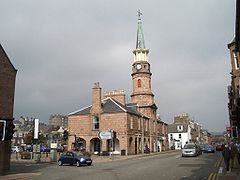Stonehaven Harbour
Stonehaven
|
|
|---|---|
 Market Square, Stonehaven |
|
| Stonehaven shown within Aberdeenshire | |
| Population | 11,602 (Scotland's Census 2011) |
| OS grid reference | NO8786 |
| Council area | |
| Lieutenancy area | |
| Country | Scotland |
| Sovereign state | United Kingdom |
| Post town | STONEHAVEN |
| Postcode district | AB39 |
| Dialling code | 01569 |
| Police | Scottish |
| Fire | Scottish |
| Ambulance | Scottish |
| EU Parliament | Scotland |
| UK Parliament | |
| Scottish Parliament | |
Stonehaven (/stoʊnˈheɪvən/; [stinˈhaiv]) is a town in Aberdeenshire, Scotland. It lies on Scotland's northeast coast and had a population of 11,602 (Scotland's Census 2011). After the demise of the town of Kincardine, which was gradually abandoned after the destruction of its royal castle in the Wars of Independence, the Scottish Parliament made Stonehaven the successor county town of Kincardineshire. Stonehaven had grown around an Iron Age fishing village, now the "Auld Toon" ("old town"), and expanded inland from the seaside. As late as the 16th century, old maps indicate the town was called Stonehyve, Stonehive, Pont also adding the alternative Duniness. It is known informally to locals as Stoney.
The town is served by Stonehaven railway station, and lies just to the east of the A90 road.
Stonehaven is the site of prehistoric events evidenced by finds at Fetteresso Castle and Neolithic pottery excavations from the Spurryhillock area. The town lies at the southern origin of the ancient Causey Mounth trackway, which was built on high ground to make passable this only available medieval route from coastal points south to Aberdeen. This ancient passage specifically connected the Bridge of Dee to Cowie Castle via the Portlethen Moss and the Stonehaven central plaza. The route was that taken by the Earl Marischal and Marquess of Montrose when they led a Covenanter army of over 9000 men in the first battle of the English Civil War in 1639. Originally the settlement of Stonehaven grew and prospered and was known as Kilwhang. With 'Kil' meaning hill and 'whang' the name, or sound of a whip, possibly, the name is derived from the cliffs above the original settlement and the sound of wind whistling around their meagre shelters.
...
Wikipedia

